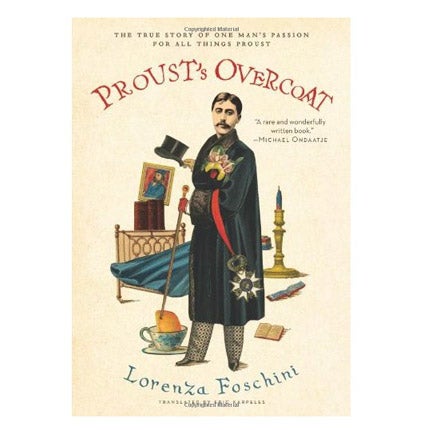Proust's Overcoat, By Lorenza Foschini
In search of lost artefacts

Marcel Proust worked at night. Tormented by illness, he would retire to his bedchamber, drape his old overcoat over the bedclothes for extra warmth, and draft and redraft that most voluminous of masterpieces, In Search of Lost Time – finally completing it only a few months before his death.
He left behind an enormous mass of manuscripts and letters, as well as personal effects, including the coat.
Most of these possessions fell into the hands of his sister-in-law, Marthe, who burnt some and would have been happy to destroy all. Vehemently prejudiced against his homosexuality and louche lifestyle, she did not wish Proust's name to endure.
Fortunately, Jacques Guérin intervened. Guérin was an insatiable bibliophile, tireless in his quest for literary memorabilia. He owned the Parfums d'Orsay perfume house and had the funds to indulge his addiction. He purchased Proust's desk and bookcase from one Monsieur Werner, a spivvy dealer who became close to Marthe. Werner was a source of many further finds. Guérin went on to befriend Marthe herself, and to prise more Proust artefacts away from her. Eventually he acquired all of the furniture from Proust's bedchamber. But the star of his collection was the coat. Werner had been using it as a blanket while out on his boat on the river Marne. Prior to Guérin's loving restoration, it was in a sorry state, its lining of otter fur infested with insects.
Lorenza Foschini's tale (translated by Eric Karpeles) has satisfying symmetries. Proust was fascinated by the concept of resurrection, while Guérin came to see himself as the saviour of Proust's physical heritage. Both Proust and Guérin present uncannily perfect illustrations for the notion, woven into In Search of Lost Time, that our souls can be held captive by inanimate objects. Yet the reclamation of Proust's chattels could never recapture his inner world. Guérin's literary taxidermy secured mere palimpsests: the paper that bore the weight of Proust's pen, the furniture that supported his body, and the coat, his constant companion.
For all Proust's Olympian efforts, his project to dissolve past and present into shimmering streams of recollection could only fail, since even the finest literary art ultimately must. This intriguing account of a collector's quest also offers an engaging, oblique perspective on the elusive essence of literary creation.
Join our commenting forum
Join thought-provoking conversations, follow other Independent readers and see their replies
Comments
Bookmark popover
Removed from bookmarks